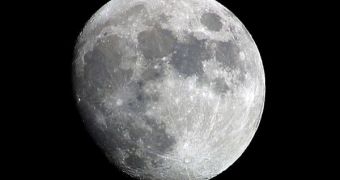Between 2007 and 2011, eight missions were flown, or will be flown to the Moon, in a genuine flurry of exploration. Undoubtedly, it won't be too long until we will send astronauts there again, and lay the foundation of permanent lunar bases, at first only for research, but later on for habitation as well. But, though that scenario is still some way away, analysts are already beginning to wonder how nations will handle the Moon problem, in terms of ownership. It may be that they will attempt to divide it in parts, as they did when Antarctica was first claimed, NewScientist reports.
Oxygen and water are at this point the main resources on the Moon, although some spacecrafts have hinted at the fact that chemical elements such as uranium or plutonium may also be present under the surface. Nations seeking to claim a sphere of interest in Earth's satellite would essentially “fight” for control over these resources, experts believe. The United Nations anticipated these issues when it drafted the Lunar Treaty in the 1990s, but major space powers have yet to sign it, which means that the stage is set for a scramble for territory.
If history is any indication, the scramble will take place in two stages – colonization and staking the actual claim. Early explorers in the Antarctic, for instance, made it that the United Kingdom and Norway now claim about one sixth of the Southern Continent each. The same type of action may already be unfolding in the case of the Moon as well, with the first steps having already been taken some four decades ago. “Whoever first conquers the moon will benefit first,” the chief scientist of China's moon exploration program, Ouyang Ziyuan, told the BBC at one point.
British National Space Center (BNSC) head of space science and exploration David Parker called these ideas – of colonization and claim – Machiavellian, and refused to comment on them. Taking this road is long and expensive, but nations in general are known for their patience when it comes to resolving issues they take an active interest in. For instance, it took more than a century until the Antarctica issue was settled, and, drawing a historical parallel, we are already about halfway through the century of quarrel that could, in the near future, culminate in the Moon being divided by space powers.

 14 DAY TRIAL //
14 DAY TRIAL //